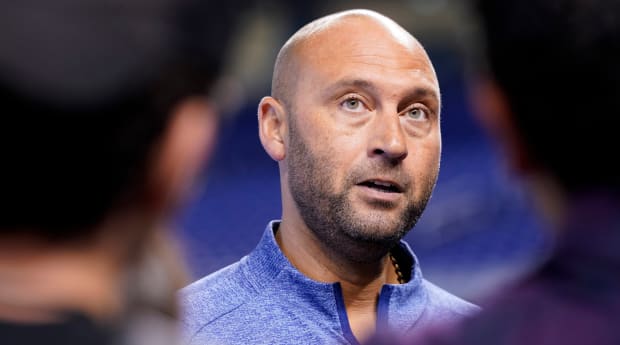The Hall of Famer handed the union a win when he stepped down as Marlins CEO on the same day as MLB’s imposed deadline.
The most valuable asset in MLB walked away from the management side of the business on the same day the commissioner established as a deadline in labor negotiations. Whether the two items are connected by choice or by coincidence is unclear, but the effect is not: Derek Jeter became a player again Monday by suddenly quitting his role as CEO and part owner of the Miami Marlins.
This is a bigger story than the labor negotiations. Someday there will be an agreement and someday there will be baseball. But Jeter, a Hall of Famer and one the most popular players of the past quarter century, and thereby one of the most influential, does not want to be part of it.

AP Photo/Lynne Sladky
You can parse the statements of Jeter and owner Bruce Sherman all you want for the clues. The bottom line is that Jeter could not abide by the way the owner wants to run the team. And so the guy who never quit anything, who insisted on hobbling off the field with a broken foot rather than being carried, the same stubborn soul who used the same model bat for all of his 12,602 plate appearances as a big leaguer, quit baseball. At least the management side of it. The situation was that bad to him—it was that contrary to his ethos of what it takes to win.
Jeter said in his statement, “The vision for the future of the franchise is different than the one I signed up to lead. Now is the right time for me to step aside as a new season begins.”
The translation from one source familiar with the situation: “The player went back to being a player again.” It was about winning, as it always is for Jeter.
Marlins personnel were said to be shocked when the news dropped in an organizational Zoom call Monday morning. All MLB transactions have been on hold since the lockout began Dec. 2. It was impossible to argue over money not spent or a trade not made because the baseball world was frozen. It was possible to argue over theoretical moves, such as how the Marlins would proceed once the lockout ended.
Jeter had built a pitching-rich organization, crafted a playoff team (albeit in the COVID-19-shortened season) that won a postseason series, brought a Yankees-style aesthetic to player development (winning, not just skill improvement, mattered) and made the groundbreaking hire of Kim Ng as the team’s general manager. She was part of Jeter’s handpicked coterie of Yankees-trained influencers, including manager Don Mattingly, personnel director Gary Denbo and adviser Jorge Posada. With its dynamic young pitching, the team was one or two bats short of contending for the NL East title. A foundation was there.
Jeter himself moved his family from the Tampa area to Miami when he joined the Marlins five years ago. He studied Spanish, spent hours courting business leaders in the Miami area and redesigned the ballpark experience to give it a fresher, more dynamic vibe. For him to yield his equity investment of sweat and money, as well as leaving those who bought into his vision, speaks to the enormity of the disconnect with Sherman.
If you’re not all in on winning, you’re not on Jeter’s team. My favorite story about Jeter’s competitiveness happened as the Yankees were getting blown out in the 2001 World Series Game 6 in Arizona. The rout was so bad that manager Joe Torre pulled some of his starters, including Jeter. In the clubhouse, Jeter overheard pitcher Jay Witasik, who had just given up nine runs, talk about how he at least had fun pitching in his first World Series game. Jeter lit into Witasik for his insouciance. Posada said it was the angriest he had seen the captain.
Something went off the rails with Jeter’s plans to win in Florida. In at least one way, the team’s finances were impacted by COVID-19. When Jeter bought into the team, he counted on vastly improving the team’s MLB-worst TV deal, which paid the Marlins only about $18 million a year. The Marlins expected they could pull in $60 million or more per year. But COVID-19 and cord-cutting happened, and the Marlins did well to get slightly more than $50 million.
The timing of his exit is nothing if not curious. It comes at a time when players and owners are in knock-down, drag-out negotiations in which one of the players’ main concerns is that not enough owners want to win badly enough. They see a system in which teams don’t properly use revenue sharing handouts and look at “tanking” as a smart strategy. They wonder if low-revenue teams that are not so heavily attendance-driven wouldn’t mind missing games in April, when attendance traditionally is lowest. Even if there is no connection, Jeter just handed the players a win in 11th-hour labor negotiations. He essentially announced Marlins ownership doesn’t want to win as much as he does, a proxy for the labor fight.
“The biggest winner here is the players association,” the source said. “It doesn’t have to be what was intended. But it sends an important message.”
This much is certain: MLB is worse without Jeter.
More MLB Coverage:
• Regular Season Game Cancellations Look Likely
• Rob Manfred’s Argument About Owning an MLB Team Is False
• Baseball’s Greatest Threat Isn’t the Lockout
• Andrew Miller Explains Key Lockout Issues for MLBPA